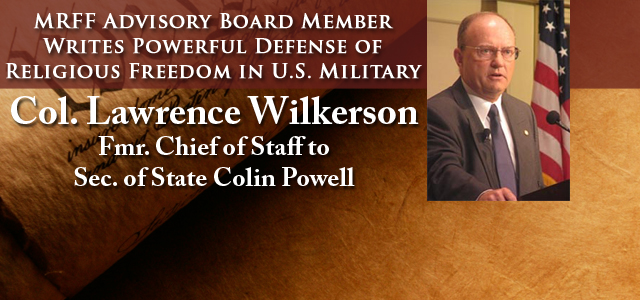McCLATCHY & TRUTHOUT – Tomas de Torquemada in the U.S. armed forces

Selected Article Excerpts:
- About a month ago, I joined the advisory board of the Military Religious Freedom Foundation (MRFF) to replace Glen Doherty, a former Navy SEAL and member of the board who had recently been killed in the Benghazi incident. I was a reluctant recruit, knowing as I did the importance of spiritual solace amid the horrors of battle.”Why,” I asked myself, “should we meddle with something so important?”
- When the MRFF’s director, Mikey Weinstein, allowed me to study the extent and nature of the activities of certain fundamentalists within the ranks of the U.S. Armed Forces – and I poured through records of their obscenities, vicious hatred and other manifestations of their more insidious members’ minds – I changed my mind. That so-called followers of Christ could write and say such things, and their defenders and representatives in the media, Congress and elsewhere could ally with them, made my blood boil.I knew that sexual assault, suicide and war wounds were already tearing up the military. Now, yet another perniciously destructive anomaly threatened good order and discipline in the ranks. And this one came from an almost unbelievable source: so-called Christians.When I joined its board, the MRFF had more than 32,000 clients. These were uniformed troops or civilians who worked in the military. Most – more than 90 percent – were themselves Christians. A few were Jewish, Muslim, members of niche religions, or non-believers. All felt persecuted, many because of coercion or duress brought against them personally from within the chain of command of their leadership, a direct violation of the Uniformed Code of Military Justice and of the separation clause in the U.S. Constitution.Whether being ordered to attend Christian prayer breakfasts, constantly derided for being non-Christian, or simply pressured to “get right with Jesus,” this persecution often came with the outright or tacit blessing of the military leadership. Indeed, it often emanated from that leadership. It happened in military units in combat zones, at service academies, on ships at sea, on military installations, virtually everywhere the military operated.In the midst of this persecution, the MRFF became quickly known and sought out by soldiers, airmen, Marines, sailors, coastguardsmen, and the civilians who worked with them – sought out because it was the only source of comfort, support and often relief from the persecution.The MRFF protected the identity, unit affiliation and other information of every client; yet it also acted to right the wrong, often to force the leadership to recognize the problem and do something about it, without endangering the client’s career or even life.That’s why I joined the advisory board, to do whatever I could to help stop this persecution, this violation of the law and the U.S. Constitution.
- I’ve read Sarah Blum’s book, “Women Under Fire,” and I’ve watched Kirby Dick’s film, “The Invisible War.” Both vividly document that sexual assault is ripping the heart out of our military.Now, we have a breed of fundamentalist Christians trying to proselytize our armed forces into hell.Perhaps worse, we have news media, members of Congress, research councils and a host of what I can only call radical fundamentalist organizations – American Taliban? – who constantly support them, urge them on, and demonize organizations like the MRFF.Next, we will have the construction of fundamentalist Christian madrassas all across this great land.
Click to read at Truthout
Click to read at McClatchy Washington Bureau
Recent Posts
- December 22, 2025 | No comments
- December 18, 2025 | 2 comments



